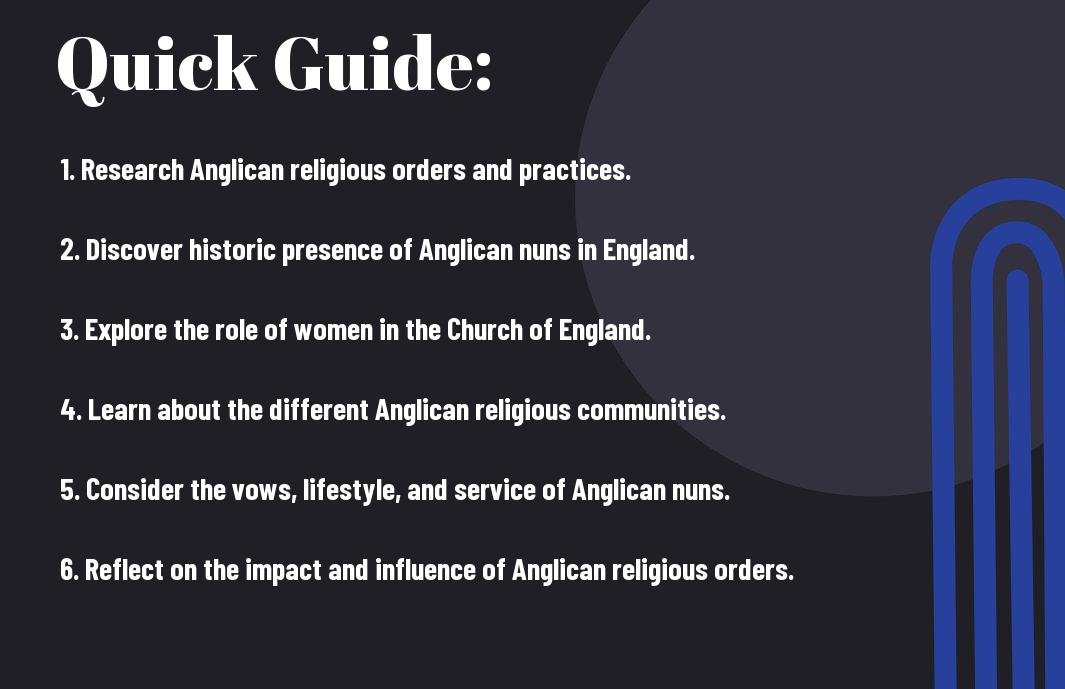Rarely do people consider the presence of nuns within the Church of England, but the reality is that there are indeed religious orders and practices within the Anglican Communion. When we think of nuns, we often associate them with the Roman Catholic Church, but the Church of England also has a rich tradition of religious life. In this guide, I will explore the history of nuns in the Church of England, the different religious orders present, and the practices that they engage in. Whether you have a deep interest in religious life within the Anglican Communion or are simply curious about this often overlooked aspect of the Church of England, this guide will provide you with a comprehensive overview of the topic.
Key Takeaways:
- The Church of England does have nuns. While the term “nun” is often associated with the Roman Catholic Church, the Church of England also has religious sisters who live in community, take vows, and commit themselves to a life of prayer and service.
- Religious orders within the Anglican Communion are diverse and may include both nuns and monks, who follow different rules and traditions. Some religious orders are contemplative, focused on prayer and meditation, while others are active, engaging in social services and mission work.
- Anglican nuns may be affiliated with specific dioceses, cathedrals, or independent communities, and their work may involve a wide range of activities, including education, healthcare, and advocacy for social justice.
- Like Catholic nuns, Anglican nuns take vows of poverty, chastity, and obedience, and they may wear religious habits. However, the specific rules and traditions of Anglican religious orders can differ from those of the Catholic Church.
- Anglican nuns play a vital role in the life of the Church of England, providing spiritual leadership, guidance, and support to their communities and engaging in the wider mission of the church.
Types of Religious Orders within the Anglican Communion
For those unfamiliar with the Anglican Communion, it may come as a surprise that there are indeed religious orders within the Church of England. These orders are not as widely known as those in the Catholic Church, but they do exist and play a significant role within the Anglican tradition. There are several types of religious orders within the Anglican Communion, each with its own unique characteristics and practices.
| Monastic Orders | Monastic orders are composed of monks and nuns who live in communities, devoting themselves to a life of prayer and contemplation. They follow a rule of life, usually based on the teachings of a particular spiritual leader or saint, and may take vows of poverty, chastity, and obedience. |
| Sisterhoods | Sisterhoods are communities of women who live in religious community together. They may engage in a variety of ministries, including teaching, nursing, and social work. These women take vows similar to those of the monastic orders, and are dedicated to a life of prayer and service. |
| Friaries | Friaries are communities of men who, like monks and nuns, live in religious community together. They may engage in similar ministries as sisterhoods, and take similar vows. |
| Religious Communities | Religious communities are similar to monastic orders and sisterhoods, but may not be as strictly bound by a particular rule of life. They are often dedicated to a specific ministry or cause, such as social justice, environmental stewardship, or peacemaking. |
| Secular Institutes | Secular institutes are associations of lay people who live individually in the world, but dedicate themselves to a particular form of living the Christian life. This can include evangelism, social justice, or contemplation. |
Monastic Orders
Monastic orders within the Anglican Communion follow a rule of life that is usually based on the teachings of a particular spiritual leader or saint. The monks and nuns who belong to these orders live in community, devoting themselves to a life of prayer and contemplation. They often take vows of poverty, chastity, and obedience, and spend their days in worship and manual labor.
Sisterhoods
Sisterhoods are communities of women who live in religious community together, dedicating themselves to a life of prayer and service. These women take similar vows to those of the monastic orders, and engage in a variety of ministries, including teaching, nursing, and social work. They are a powerful force for good within the Anglican Communion, providing care and support to those in need.
Tips for Joining a Religious Order within the Anglican Communion
Any individual considering joining a religious order within the Anglican Communion should carefully consider the commitment and lifestyle involved. Here are some tips to help you navigate this important decision:
- Research different religious orders and their distinct practices and traditions to find the right fit for you.
- Connect with members of the religious order you are interested in to learn more about their experiences and the daily life within the community.
- Seek spiritual direction from a trusted advisor or mentor within the Anglican Communion to help you discern your calling and navigate the process of joining a religious order.
- Consider attending retreats or workshops focused on vocation and discernment within the Anglican tradition to gain a deeper understanding of religious life.
Knowing that joining a religious order is a significant commitment, take your time to explore and discern whether this path is right for you.
Understanding the Vows
When considering joining a religious order within the Anglican Communion, it is crucial to understand the vows that form the foundation of religious life. These vows typically include poverty, chastity, and obedience. Each vow holds significant spiritual and practical implications for the individual entering the religious life, as they commit to living a life of radical simplicity, celibacy, and submission to the will of God, as expressed through the community.
Seeking Spiritual Direction
Seeking spiritual direction is essential for anyone considering joining a religious order within the Anglican Communion. Through spiritual direction, you can receive personal guidance, support, and discernment as you navigate the decision-making process. I encourage you to seek out a trusted spiritual director within the Anglican tradition who can provide wisdom and insight as you explore your vocation.
Step-by-Step Process to Becoming a Nun in the Church of England
Unlike some other religious denominations, the process of becoming a nun in the Church of England follows a specific set of steps. It is important to understand the requirements and commitments involved in this life-changing decision. Below, I have broken down the process into a clear and concise format to help you understand what is involved in becoming a nun in the Church of England.
Discerning the Call
Discerning the call to become a nun is a deeply personal and spiritual process. It involves prayer, reflection, and seeking guidance from spiritual mentors. It is important to carefully consider whether a life of prayer, celibacy, and community living is the right path for you. This process may take months or even years as you listen to the inner voice of God and seek clarity about your vocation.
Application and Admission
Once you have discerned a call to become a nun, the next step is to formally apply to a religious community within the Church of England. Each community may have its own specific requirements for admission, which may include age limits, health checks, and interviews with the leadership team. It is important to be prepared to undergo a period of discernment and probation before being accepted as a member of the community. This may involve living and working alongside the community to determine fit and suitability for the lifestyle.
Factors to Consider Before Joining a Religious Order in the Church of England
Despite the appeal of a religious vocation, joining a religious order within the Church of England is not a decision to be taken lightly. It requires careful consideration and self-reflection to ensure that you are truly ready for the commitment and challenges that come with religious life. Below are factors to consider before embarking on this path:
- Personal commitment: Before joining a religious order, it is crucial to assess your own motivations and readiness for a life devoted to God. This involves examining your willingness to sacrifice personal desires and adhere to the vows of chastity, poverty, and obedience.
- Community life: An essential aspect of religious orders is the shared community life with fellow members. Consider whether you are prepared to live in close quarters with others, participating in communal prayers, work, and recreation.
- Emotional and psychological preparedness: Joining a religious order can bring about significant emotional and psychological challenges. It is important to evaluate your resilience and adaptability to navigate the demands of religious life.
Personal Commitment
When considering joining a religious order within the Church of England, it is essential to evaluate your personal commitment to a life of devotion and spiritual discipline. This involves examining your motivations, values, and spiritual calling to ensure that you are fully prepared for the challenges and sacrifices that come with religious life.
Community Life
Living within a community is a fundamental aspect of joining a religious order in the Church of England. This means sharing living spaces, daily routines, and spiritual practices with fellow members. It is important to reflect on your readiness to embrace communal living and the interpersonal dynamics that come with it, as well as the impact it may have on your individuality and personal freedom.
Pros and Cons of Being a Nun in the Church of England
After considering the unique calling and commitment required to become a nun in the Church of England, it is important to weigh the pros and cons of this religious vocation. Here, I will break down the advantages and challenges of living a life dedicated to God within the Anglican Communion.
| Pros | Cons |
| Deep sense of spiritual fulfillment | Challenges in maintaining celibacy |
| Community support and solidarity | Personal sacrifices and restrictions |
| Opportunities for meaningful service and ministry | Isolation from the outside world |
| Structured daily prayer and worship | Limited personal autonomy |
| Fulfilling the calling to live a life of poverty | Adherence to strict rules and routines |
Pros of Religious Life
Embracing the life of a nun within the Church of England offers a deep sense of spiritual fulfillment. Living in community with other sisters provides a profound sense of support and solidarity and offers numerous opportunities for meaningful service and ministry. Additionally, structured daily prayer and worship become integral aspects of one’s life, fostering a strong connection with God and others.
Cons and Challenges
Despite the many rewards, the life of a nun in the Church of England also comes with its own set of challenges. Maintaining celibacy, making personal sacrifices, and facing isolation from the outside world are just a few of the difficulties that nuns may encounter. It also involves adherence to strict rules and routines, as well as the limited personal autonomy that comes with the territory.

Conclusion
Taking this into account, it is clear that the Church of England does have nuns, as well as other religious orders and practices within the Anglican Communion. While the role and presence of nuns may not be as prominent as within the Catholic Church, there are still various orders and communities of women who dedicate themselves to a life of prayer, service, and community within the Anglican tradition. These religious orders play an important role in the spiritual and social fabric of the Church of England, and their presence is a testament to the diversity and richness of the Anglican Communion.
FAQ
Q: Does the Church of England have nuns?
A: Yes, the Church of England does have nuns. There are various religious orders and practices within the Anglican Communion, including those of nuns.
Q: What are religious orders within the Anglican Communion?
A: Religious orders within the Anglican Communion are communities of men or women who vow to live a religious life according to a specific rule. These orders often engage in prayer, study, and various forms of ministry.
Q: What is the role of nuns within the Church of England?
A: Nuns within the Church of England play a vital role in their communities through prayer, hospitality, and various forms of ministry such as teaching and social work. They may also engage in other forms of service based on the particular charism of their order.
Q: Are there different types of religious orders within the Anglican Communion?
A: Yes, there are various types of religious orders within the Anglican Communion, each with its own specific rule and focus. Some orders may be contemplative, focusing on a life of prayer, while others may be more active, engaging in ministries such as education or healthcare.
Q: How are nuns and religious orders connected to the broader Anglican Church?
A: Nuns and religious orders are connected to the broader Anglican Church through their commitment to the faith, their participation in the sacramental life of the church, and their support of the church’s mission and ministry. They often maintain close ties with local parishes and dioceses while also being a part of the wider global Anglican Communion.











